Cape May, New Jersey: 24-28 September 2021
Every autumn, my closest birding colleagues and I migrate to Cape May, New Jersey, to experience the fall migration of dragonflies, butterflies, falcons, warblers, and hawks and eagles. Cape May features beautiful weather in September and October, and the town also offers up a nice selection of restaurants. This makes for a very pleasant weekend of naturizing, reminiscing, and dining.
For nature, we have a traditional
series of sites that we like to visit during our stay. Each provides unique
encounters with the migration phenomenon.
The place where every birder
likes to meet up is the hawk-watch platform at Cape May Point State Park. This
is where the Cape May Bird Observatory conducts its autumn raptor count.
The 2020 season produced a count
of 31,595 raptors, including more than 10,000 Sharp-shinned Hawks, 4,700
American Kestrels, 733 Peregrine Falcons, and 635 Bald Eagles, among the sixteen
species it regularly counts. The watch also counts other bird species that
migrate by.
The State Park is right on the
shore where the Delaware Bay meets the Atlantic Ocean, and there are trails
that give access to ponds, woods, scrub, and a broad white beach. Lots of sea
ducks migrate along the beach in the late autumn.
Groups of eager birders assemble on the large wooden platform that gives a good look across the Park, allowing the counters to pick up the raptors as they pass by. Some pass by low and right over the platform, but most are seen as small specks as they glide by at high elevation.
a large juvenile Bald Eagle tussling with a smaller adult Bald EagleThe Bird Observatory also has a natural history bookshop that sells birding optics at the Northwood Center, about a half-mile from the State Park. This is set in a tiny patch of woods that can be great for birding on certain windy days, when scores of migrant warblers seek out the woods to shelter and feed.
Nearby the Northwood Center is
Lily Lake and tree-lined avenues that can be very birdy on select autumn days.
The Siberian Elms sometimes produce effusions of tiny insects that attract
clots of foraging songbirds at eye level. This is great for photographers.
Most mornings, we all meet up at
the dune-top platform at the south end of Coral Avenue, just a bit west of the
State Park. As many as twenty birders will perch here and watch passing Ospreys,
Bald Eagle, falcons, accipiters, and wood warblers on days with strong northwest
winds. Most of the birds pass along the pine-topped dune from east to west as
they look the move back up the northern shore of Delaware Bay.
They are migrating northwestward, even though they want to head south. This is because many birds do not enjoy crossing broad expanses of salt water. The northwest wind blows the migrating birds down into the geographic cul-de-sac that is Cape May Point.
MerlinCertain birds (e.g., Bald Eagle, Osprey, Peregrine) will simply head out from the Point and cross to Cape Henlopen, Delaware, just to the southeast across the broad mouth of Delaware Bay. But the vast proportion of songbirds head up to where they can cross Delaware Bay where it is less challenging.
Coral Avenue is where one sees how brilliant some birders are. Over and over in a morning these experts call out the species names of tiny songbirds that look like moving specks high in the sky. They distinguish species by behavior, shape, movement, and the high-pitched call notes emitted by the birds in flight.
This year I watched Michael O’Brien and Alex Wiebe call out the names: Blue Grosbeak, Dickcissel, Indigo Bunting, Blackpoll Warbler, Bobolink, and others. We mortals struggled to pick out these tiny waifs moving through the sky...
The main challenge of Coral Avenue,
as well as most birding venues in Cape May, is that in the throws of migration,
most of the birds are on the move and seen only in flight. That makes seeing
them well and photographing them more difficult.
Just east of the State Park is
the Nature Conservancy’s south Cape May Meadows reserve. This abuts the
boundary of the State Park, and is another nice place to stretch one’s legs and
look for birds and butterflies.
This year there were some shallow
wetlands that hosted several species of waders, visible from an elevated blind.
We spent long periods in the blind, looking down on foraging sandpipers at very
close range.
Separating the Semipalmated from
Least Sandpipers was fun, but identification of the single isolated Western
Sandpiper took the intervention of the experts to I.D.
I showed three different local
authorities the photographs of this bird, and all quickly produced the same
identification. Great minds think alike.
The Meadows has a number of
trails through open scrub and this is great for looking at butterflies and
dragonflies, when the birds are not much in evidence.
Right in town, on Beach Avenue, one can find a wintering flock of Black Skimmers on the main bathing beach. It is always fun to spend time with this flock. They make a great photo subject...
four views of Black Skimmers
Farther afield from Cape May
Point, one can venture off “Cape Island” to the northeast to find other great
birding locations.
Further northeast, one comes to
Stone Harbor Point, which is a sandy point that is all parkland, welcoming to
birds and walkers. Its about a forty minute walk through beach sand to the
point from the parking lot, and on a beautiful autumn day it is a paradise on
earth.
The breakers hit the beach to the
left, and the marshy estuary is to the right, with a very low dune rise down
the middle. Birds can be seen in every direction.
We spent a fair amount of time
chasing down the moving flocks of American Oystercatchers. Our high count was
173. That’s a lot of oystercatchers.
oystercatchers... and look for Marbled Godwit in lower image (head and bill obscured)
There are lots of gulls here as
well as terns. Lesser Black-backed Gulls and Caspian Terns were the ones that
caught our eye.
We also found flocks of migrant
Semipalmated Plovers and the local resident Piping Plovers, much paler and
blending into the fluffy white sand.
Come evening, our thoughts turned to fresh seafood. This year we dined at Blue Pig, Freda’s, and Sapore Italiano—all at the top of their game. The key is to start making reservations at least a week in advance...
The motels fill up quickly on
autumn weekends. I get around this by tent-camping. At night, from my tent in
the Depot Travel Park on Broadway, in West Cape May, I had the pleasure of
hearing a yipping pack of Coyotes one night. On another night, I heard four
Barred Owls calling all at once. It’s worth waking up for that!















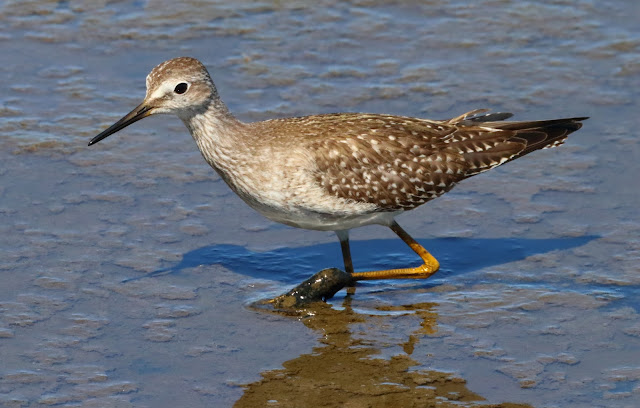


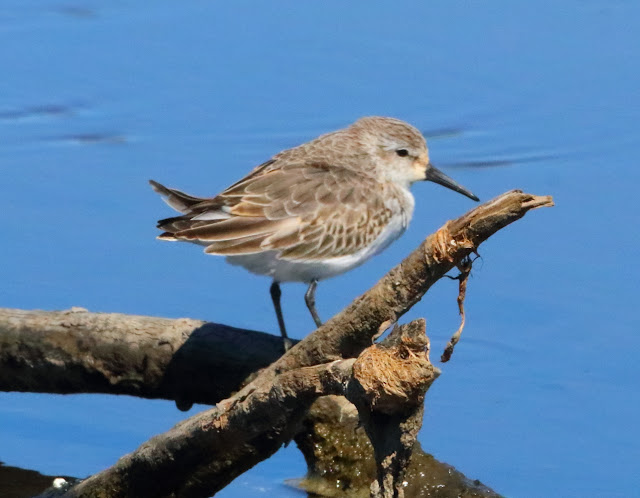




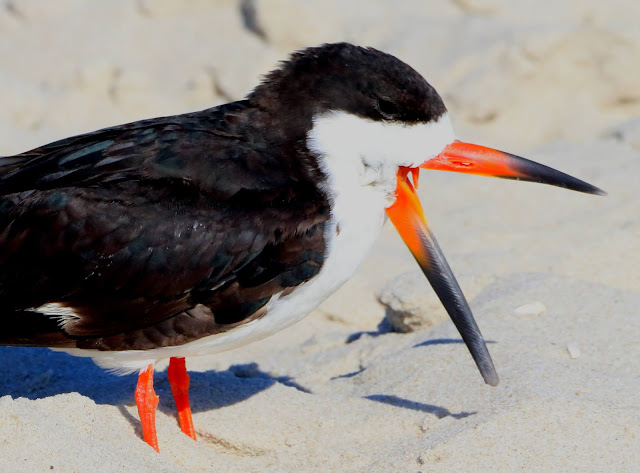
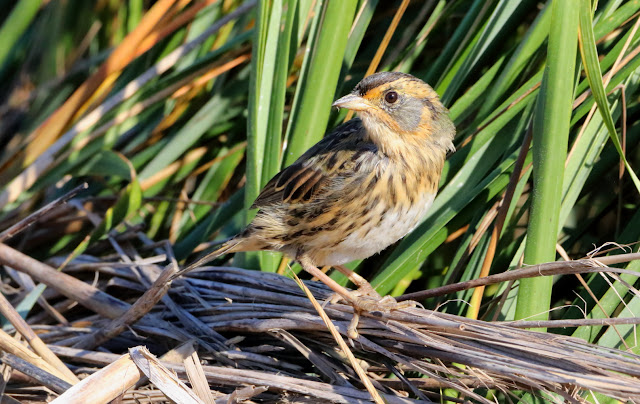






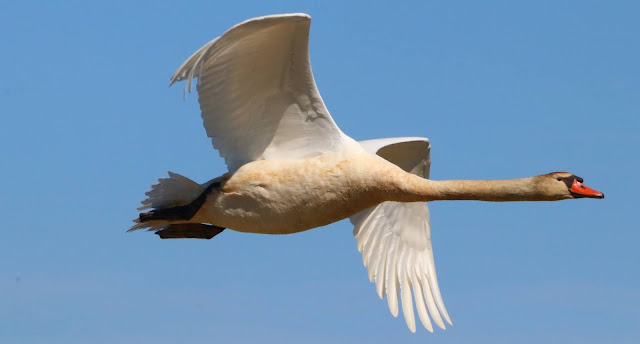

Your description and photographs opened up new possibilities for exploration and enjoyment in Cape May and near by areas. Thank you!
ReplyDeleteThank you from Time Of Usa for sharing such information
ReplyDeleteBruce, I always enjoy your blogs with accompanying photos. The winter Adirondack scenes exude quiet and solitude! Waggoners Gap photos astound me! Those rocks never get comfortable to sit on! Cape May draws me each year for the Monarchs,Black Skimmers, and waterfowl. Thank you for sharing your joy!
ReplyDeleteDear Sir/Madam,
ReplyDeleteInstant Personal Loans – There are times when you might need money urgently at a very short notice but are running out of cash. You may wonder as to which lender might sanction a loan at such an occasion! Much to your surprise, you can avail instant personal loans immediately. They are processed very fast, say within 24 hours. You can use these loans for any personal need of yours. You also have the choice to apply for this loan online. Yes, within the comfort of your home, you can apply for this loan and save yourself of all the hassles which you might have to go through otherwise contact us now: email: apply@ronniefinance.ltd ronniefinancehome247@gmail.com
Ronnie Finance Ltd
Whats-App on +91 93118 56893
http://ronniefinance.ltd/fastloan
Dr. Mark Thomas
ReplyDeleteThank you for this helpful blog , i found this very helpful.
Learn Web desidning and digital marketing for free from the professionals by just visiting the links. This offer is valid for a limited period so hurry up now visit the link to know more about the digital marketing, SEO , Web designing etc
Top SEO Company in Delhi NCR
SEO Company in Delhi NCR
Best SEO Company in Delhi
Affordable SEO Company in India
Best SEO Company in Delhi Ncr
Thanks for sharing such a nice one with us. Get all information regarding
ReplyDeletePhoto Editing Services canada
Photo Retouching Services canada
Real Estate Photo Retouching Services canada
Ghost Mannequin Services canada
DO YOU NEED FINANCES? ARE YOU LOOKING FOR FINANCES? ARE YOU LOOKING FOR FINANCING TO ENLARGE YOUR BUSINESS? via email:bullsindia187@gmail.com
ReplyDelete